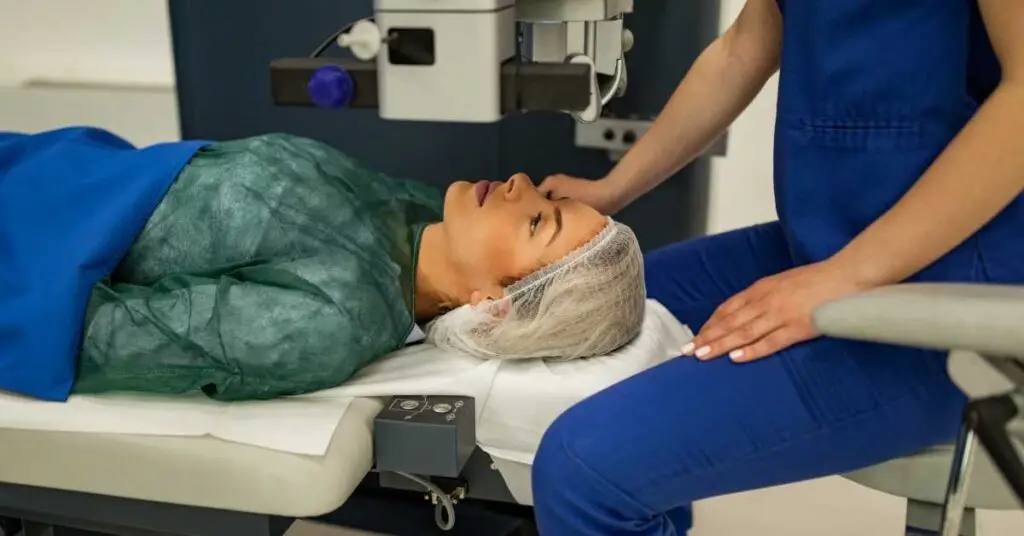Laser eye surgery is a treatment that uses a focused beam of light to reshape the surface of the eye. It can be used to treat a variety of vision problems, including nearsightedness, farsightedness, and astigmatism. The surgery is performed by an ophthalmologist, a medical doctor who specializes in the care and treatment of the eyes. During the procedure, the eye is numbed with drops and the surgeon makes a small incision in the cornea, the clear front window of the eye. A laser is then used to remove or reshape tissue in order to improve vision. In most cases, laser eye surgery is successful in improving vision and reducing or eliminating the need for glasses or contact lenses. However, as with any surgical procedure, there are risks involved, and it is important to consult with an ophthalmologist to determine if laser eye surgery is right for you.
Can laser eye surgery correct the need for reading glasses? No, it can’t. Traditionally, laser eye surgery could only treat shortsightedness or farsightedness and astigmatism. It couldn’t treat the need for reading glasses.
However, a new type of laser eye surgery called presbyopia-correcting implantable lenses (IOLs) can treat presbyopia, which is the age-related loss of near vision. This type of surgery is still relatively new and expensive, so it’s not an option for everyone. If you’re interested in presbyopia-correcting IOLs, be sure to talk to your doctor to see if it’s right for you.
How to prepare for your laser eye surgery appointment
Laser eye surgery is a life-changing procedure that can help you achieve better vision. But before you undergo surgery, there are a few things you need to do to ensure a successful outcome.
First, it’s important to find a reputable laser eye surgeon who has experience performing the procedure. Once you’ve found a qualified surgeon, schedule a consultation to learn more about the surgery and what to expect. During the consultation, be sure to ask about the surgeon’s success rate and any potential risks or complications associated with the surgery.
Once you’ve decided to move forward with laser eye surgery, the next step is to schedule an appointment with your surgeon. Most surgeons will require that you have a pre-operative evaluation prior to surgery, which may include tests and measurements of your eyes. Be sure to ask your surgeon what you need to do to prepare for this evaluation.
On the day of your surgery, try to relax and stay calm. It’s normal to feel some anxiety before undergoing any surgical procedure, but it’s important to keep in mind that laser eye surgery is generally safe and effective. Once the procedure is complete, you’ll likely notice an improvement in your vision right away. In most cases, full recovery takes place within a few days or weeks. Following your surgeon’s post-operative instructions is essential for achieving the best possible results from your surgery.
How does laser eye surgery work?
Laser eye surgery is a type of refractive surgery that uses a laser to correct vision problems. The laser is used to reshape the cornea, which is the clear, front surface of the eye. This helps to focus light more accurately on the retina, which is the back of the eye where images are formed. Laser eye surgery can be used to treat a number of different vision problems, including nearsightedness, farsightedness, and astigmatism. The procedure is usually quick and painless, and most people experience very little discomfort afterward. Recovery times vary, but many people see a significant improvement in their vision within a few days.
How to choose the right type of laser eye surgery
Laser eye surgery can be a great way to improve your vision and get rid of your glasses or contact lenses. But how do you know if it’s the right choice for you? There are a few things to consider before making the decision to have laser eye surgery.
First, you need to make sure that you are a good candidate for the procedure. This means that you have healthy eyes and don’t have any other eye conditions that could make the surgery more risky.
You also need to be sure that you are willing to commit to follow-up care, including regular eye exams and use of protective eyewear when necessary.
Finally, you need to choose a reputable surgeon who has experience performing the type of laser eye surgery you are considering. Taking the time to research your options and make an informed decision can help ensure that you have a successful experience with laser eye surgery.
What are the risks of laser eye surgery?
Laser eye surgery is a popular and effective way to improve vision, but it does come with some risks.
- The most common side effect is temporary dryness and irritation of the eyes, which usually goes away within a few days.
- Other possible risks include infections, inflammation, and blurred vision.
- In rare cases, laser eye surgery can cause more serious problems such as corneal tearing or damage to the retina.
For this reason, it is important to consult with an experienced ophthalmologist before undergoing the procedure. By understanding the risks involved, you can make an informed decision about whether or not laser eye surgery is right for you.
What are the benefits of laser eye surgery?
Laser surgery can be used to treat a variety of conditions, including nearsightedness, farsightedness, and astigmatism. The surgery is usually quick and painless, and most people experience significant improvements in their vision within a few days. In addition, laser surgery is generally safe and has a very low risk of complications. As a result, it is an increasingly popular option for people who wish to improve their vision.
What are the different types of laser eye surgery?
Laser eye surgery is a type of refractive surgery that is used to correct vision problems. There are two main types of laser eye surgery: PRK and LASIK.
PRK is a type of laser eye surgery that is used to correct nearsightedness, farsightedness, and astigmatism. The procedure involves removing a small amount of tissue from the cornea, which is then reshaped with a laser.
LASIK is a type of laser eye surgery that is used to correct nearsightedness, farsightedness, and astigmatism. The procedure involves making a small incision in the cornea and then using a laser to reshape the tissue.
Both PRK and LASIK are effective methods of correcting vision problems, but there are some differences between the two procedures. PRK typically has a longer recovery time than LASIK, but it does not require the creation of a flap in the cornea. This can be an advantage for people who are at risk for developing complications from flap-related procedures. In addition, PRK may be a better option for people who have very thin corneas or other medical conditions that make them ineligible for LASIK.
Is laser eye surgery permanent?
The short answer to this question is yes, laser eye surgery is permanent. The longer answer is that while the surgery itself is permanent, your vision may still change over time. This is especially true if you have a refractive error, which means that your eyesight depends on the shape of your eyeball. As we age, our eyeballs tend to become longer or shorter, which can cause our vision to become blurry. However, if you have laser eye surgery to correct a refractive error, your vision will remain stable as long as your eyeball doesn’t change shape.
Additionally, it’s important to note that laser eye surgery does not prevent you from developing other vision problems, such as cataracts or glaucoma. However, if you are considering laser eye surgery, it’s important to consult with an experienced doctor to determine if the procedure is right for you.
Can laser eye surgery correct presbyopia?
As people age, it becomes more difficult to focus on close objects. This condition, known as presbyopia, is the result of the hardening of the eye’s lens. Many people choose to correct presbyopia with glasses or contact lenses, but laser eye surgery is another option. During this procedure, a surgeon uses a laser to change the shape of the eye’s lens. This helps to focus light more accurately on the retina, resulting in clearer vision. Laser eye surgery can be an effective way to correct presbyopia, but it is important to consult with an eye doctor to determine if this procedure is right for you.
Conclusion
Laser eye surgery is a safe and effective way to improve your vision. The surgery can be used to correct a variety of conditions, including nearsightedness, farsightedness, and astigmatism. Most people experience significant improvements in their vision within a few days of the procedure. In addition, laser eye surgery is generally safe and has a very low risk of complications. As a result, it is an increasingly popular option for people who wish to improve their vision.












